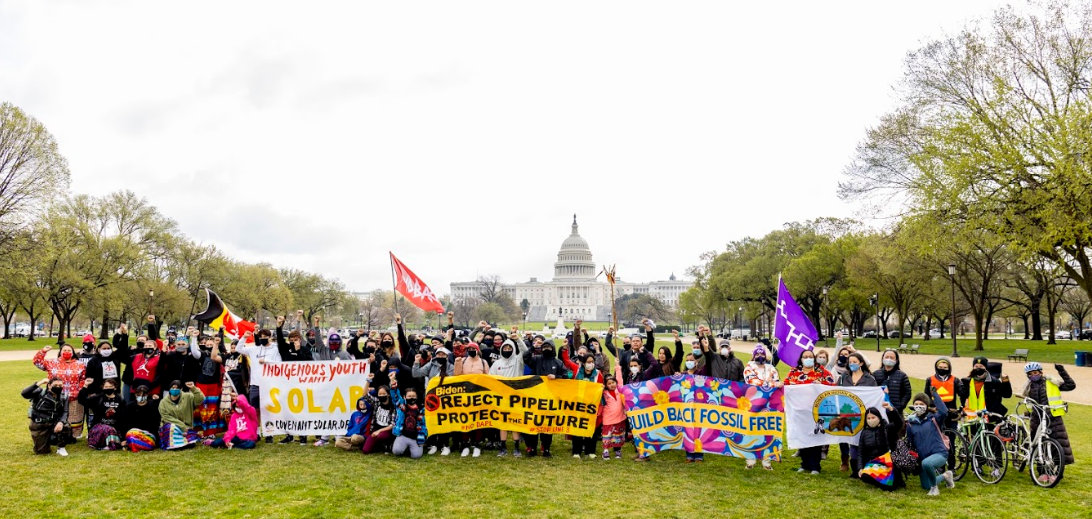
- Details
- By Levi Rickert
WASHINGTON — The U.S. Army Corps of Engineers (Corps) on Friday said they will allow the Dakota Access oil pipeline to continue to flow without a federal permit. The decision was revealed in a court filing in federal District Court the District of Columbia.
The Corps officially refrained from taking a position by saying they need more time, which will allow the pipeline to continue operating illegally, without a valid permit.
The decision comes despite strong pressure by Native Americans and environmental groups that had their hopes up the Biden administration would order the pipeline will be shut down. Last week a group of Native Americans youth marched throw the streets of Washington to outside the White House to send a strong message to President Biden to shut down the pipeline.
“We are gravely concerned about the continued operation of this pipeline, which poses an unacceptable risk to our sovereign nation,” Standing Rock Sioux Tribe Mike Faith said. “In a meeting with members of Biden’s staff earlier this year, we were told that this new administration wanted to ‘get this right.’ Unfortunately, this reported update from the U.S. Army Corps of Engineers shows it has chosen to ignore our pleas and stick to the wrong path.”
Native Americans have opposed Dakota Access pipeline because long the pipeline’s route underneath the Missouri River and the Lake Oahe reservoir constituted a major threat to the Standing Rock Sioux Tribe’s reservation and the region’s drinking water.
Earthjustice attorney Jan Hasselman, who has represented the Standing Rock Sioux Tribe since 2016, feels the Corps missed an opportunity for the Biden administration to make good on their promised they have been making about improved tribal consultation and doing some to stop climate change.
“This was their chance. There have been so many things, the new administration has said about tribal sovereignty and about environmental justice,” Hasselman said during a press conference on Friday afternoon. “The importance of addressing the climate crisis, that are so important and so meaningful but today was the day to see whether this this rhetoric was going to be met with actions, and they fell short.”
Last July, the Standing Rock Sioux Tribe won a victory when U.S. District Judge James Boasberg vacated a federal permit allowing the line to run under Lake Oahe and ordered a new environmental review.
The Corps could have shut down the pipeline as it conducts its environmental review, but instead on Friday threw the matter to the court to decide.
Judge Boasberg allowed the pipeline’s owner until April 19 to makes its case keeping the oil flowing. Hassleman said he expects the Boasberg to make his ruling in early May.
In 2016, the opposition to the construction of the Dakota Access pipeline was the impetus of the largest gathering of American Indians in over a century when tens of thousands tribal citizens from over 350 tribal nations converged on Standing Rock.
The Dakota Access pipeline ships up to 575,000 barrels of crude oil daily.
More Stories Like This
Trump signs law that revokes some limits on drilling in Alaska’s National Petroleum ReserveSouthern Sierra Miwuk Nation Gets 900-Acres ofLand Back
Chilkat Indian Village Tells New Palmer Mine Owners They Are “Not Welcome” in Chilkat Valley
Tribes, Coastal Group Ask Army Corps to Revoke Permit for Texas Export Terminal
Michigan Tribes Tell Supreme Court: Don’t Bail Out Enbridge
Help us defend tribal sovereignty.
At Native News Online, our mission is rooted in telling the stories that strengthen sovereignty and uplift Indigenous voices — not just at year’s end, but every single day.
Because of your generosity last year, we were able to keep our reporters on the ground in tribal communities, at national gatherings and in the halls of Congress — covering the issues that matter most to Indian Country: sovereignty, culture, education, health and economic opportunity.
That support sustained us through a tough year in 2025. Now, as we look to the year ahead, we need your help right now to ensure warrior journalism remains strong — reporting that defends tribal sovereignty, amplifies Native truth, and holds power accountable.
 The stakes couldn't be higher. Your support keeps Native voices heard, Native stories told and Native sovereignty defended.
The stakes couldn't be higher. Your support keeps Native voices heard, Native stories told and Native sovereignty defended.
Stand with Warrior Journalism today.
Levi Rickert (Potawatomi), Editor & Publisher

